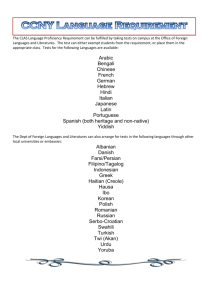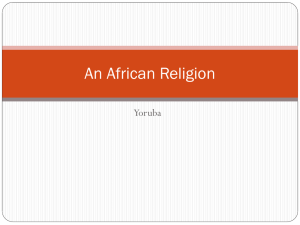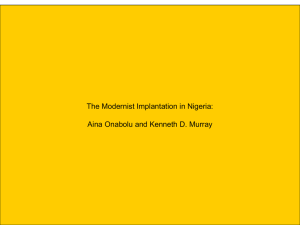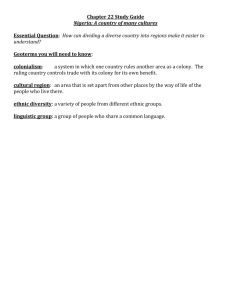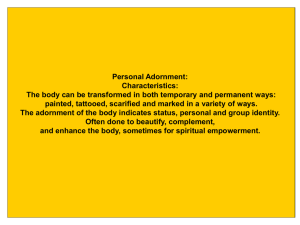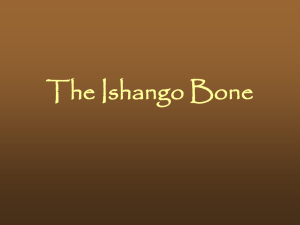Yoruba Religious Worship in Modern Context
advertisement
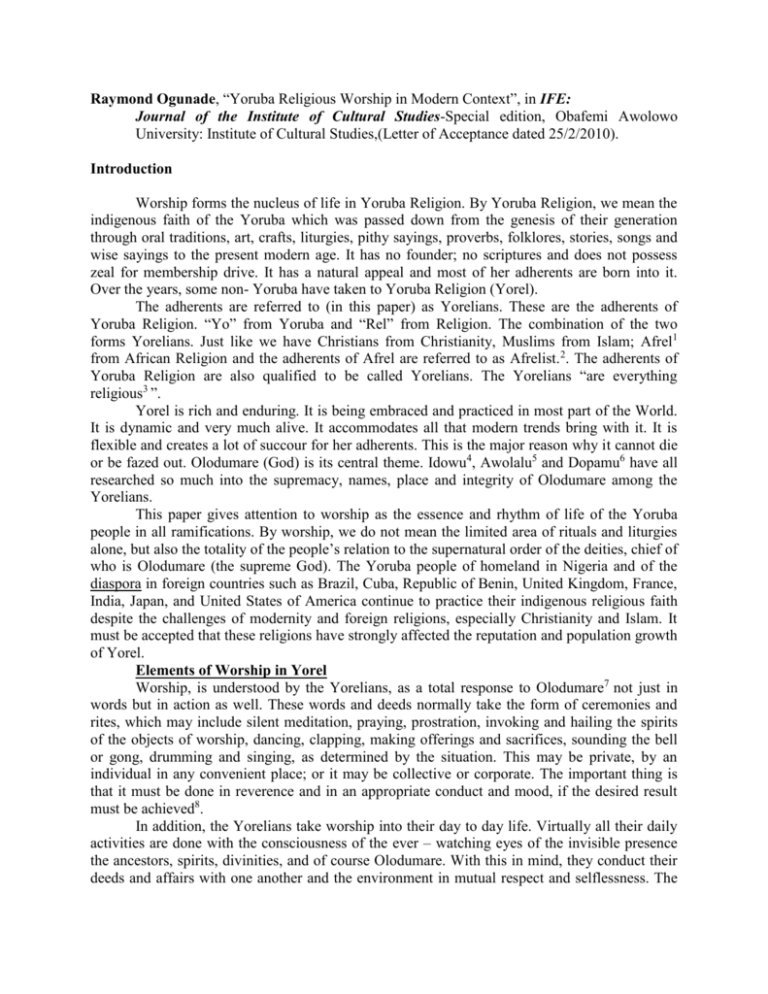
Raymond Ogunade, “Yoruba Religious Worship in Modern Context”, in IFE: Journal of the Institute of Cultural Studies-Special edition, Obafemi Awolowo University: Institute of Cultural Studies,(Letter of Acceptance dated 25/2/2010). Introduction Worship forms the nucleus of life in Yoruba Religion. By Yoruba Religion, we mean the indigenous faith of the Yoruba which was passed down from the genesis of their generation through oral traditions, art, crafts, liturgies, pithy sayings, proverbs, folklores, stories, songs and wise sayings to the present modern age. It has no founder; no scriptures and does not possess zeal for membership drive. It has a natural appeal and most of her adherents are born into it. Over the years, some non- Yoruba have taken to Yoruba Religion (Yorel). The adherents are referred to (in this paper) as Yorelians. These are the adherents of Yoruba Religion. “Yo” from Yoruba and “Rel” from Religion. The combination of the two forms Yorelians. Just like we have Christians from Christianity, Muslims from Islam; Afrel1 from African Religion and the adherents of Afrel are referred to as Afrelist. 2. The adherents of Yoruba Religion are also qualified to be called Yorelians. The Yorelians “are everything religious3 ”. Yorel is rich and enduring. It is being embraced and practiced in most part of the World. It is dynamic and very much alive. It accommodates all that modern trends bring with it. It is flexible and creates a lot of succour for her adherents. This is the major reason why it cannot die or be fazed out. Olodumare (God) is its central theme. Idowu4, Awolalu5 and Dopamu6 have all researched so much into the supremacy, names, place and integrity of Olodumare among the Yorelians. This paper gives attention to worship as the essence and rhythm of life of the Yoruba people in all ramifications. By worship, we do not mean the limited area of rituals and liturgies alone, but also the totality of the people’s relation to the supernatural order of the deities, chief of who is Olodumare (the supreme God). The Yoruba people of homeland in Nigeria and of the diaspora in foreign countries such as Brazil, Cuba, Republic of Benin, United Kingdom, France, India, Japan, and United States of America continue to practice their indigenous religious faith despite the challenges of modernity and foreign religions, especially Christianity and Islam. It must be accepted that these religions have strongly affected the reputation and population growth of Yorel. Elements of Worship in Yorel Worship, is understood by the Yorelians, as a total response to Olodumare7 not just in words but in action as well. These words and deeds normally take the form of ceremonies and rites, which may include silent meditation, praying, prostration, invoking and hailing the spirits of the objects of worship, dancing, clapping, making offerings and sacrifices, sounding the bell or gong, drumming and singing, as determined by the situation. This may be private, by an individual in any convenient place; or it may be collective or corporate. The important thing is that it must be done in reverence and in an appropriate conduct and mood, if the desired result must be achieved8. In addition, the Yorelians take worship into their day to day life. Virtually all their daily activities are done with the consciousness of the ever – watching eyes of the invisible presence the ancestors, spirits, divinities, and of course Olodumare. With this in mind, they conduct their deeds and affairs with one another and the environment in mutual respect and selflessness. The typical Yorelian life can be said to be a life of constant worship. Worship to the Yorelians has become a way of life. Every major event in their lives is attended by elaborate worship. For example in a typical formal worship libation is poured to open up the earth for the sprit beings to attend to the worship; invocation of esoteric names, praises and formulae which attracts the beings of worship, and Divination, by which means the message and revelations of the Being of Worship are made known to people. Worship is given its character also, in sacrifices (of animals and in the past, of human being)9. There are different types of sacrifices. They include propitiation (Ebo Etutu), prevention (Ebo Ogunkoja), Votive (Ebo Eje), and substitution (Ebo A-ye-pin-un), et. cetera. The liturgy also features prayer, music and dances10. Elements of the liturgy above are still in practice today. For instance Ifa is consulted regularly in the people’s bid to find solutions to their problems and anxieties – to understand the knotty, unravel the mysterious, reveal the past and predict the future in advance of possible occurrences in line with predestination. From the Ifa corpus and based on interpretation of the opele, it can be said that Ifa recommends sacrifices that people have to make in worshipping respective divinities depending on the situation which worried the consultee11. It is for this vital role that Wande Abimbola describes Ifa as the only active mouthpiece of Yoruba Religion taken as a whole. Infact according to him, Ifa serves to popularize and to immortalize them.12 A typical act of worship will include virtually all aspects of the liturgy if we go by Idowu’s description of the act of worship of Olodumare at Ile – Ife: The worshipper makes a circle of ashes or white chalk; With in the circle, which is a symbol of eternity, he pours a libation of cold water, and in the centre he places his kolanut, splits it and holding the valves firmly between the hollow of his palm, he stretches them up and prays to Olodumare, offering the kolanut; then he casts the valves within the circle. Often, a white fowl is offered in the same way13. The act of worship in the cult of divinities is usually more elaborate. However, it is noteworthy that an important aspect of worship is the responsive use of ase (May it be sanctioned) implying that the ultimate sanction of Olodumare is sought as a precondition to the granting of petitions made to the divinities. This singular factor supports the Yoruba argument of their ‘monotheistic’ theology. Apart from formal prayers, the Yoruba engage extensively in ejaculatory and extempore prayers which can rightly be termed religious worship. They approach God directly in times of emergency, need, joy and distress. Ejaculatory prayers are made to him in normal praise, thanksgiving conversation and He is called upon as witness to oaths and covenants as well as to render benevolence and blessing for a new venture be it personal matters such as commercial investment; traveling on a journey, naming a newly born baby, celebrating puberty, solemnizing marriage, writing examination and taking a new job, et. cetera. It is perhaps for this all – encompassing involvement of God in the lives of the Yoruba people that Idowu described them as being “In all things religious”. How often one hears the Yoruba say’!Olorun o! (Oh God), Olorun gba mi (save me O God), Modupe lowo Olorun (I thank God), Olorun yio see (God will do it), and mo fi oruko Olorun bura (I swear in God’s name), et. cetera. Yoruba system of naming is also reflective of the providential attributes of God, for example Oluwaseun (God has done something Good), Oluwadare (God vindicates), Oluwatoyin (God is praiseworthy), Ifabunmi (gift of Ifa), and Ogunlaja (ogun settles quarrells), et cetera. Indeed the Yoruba religious worship (in belief and act) is very grand. Conflicts and Compromise in Yoruba Religious Worship A. Modern Challenges to Yoruba Indigineous Worship (i) Modernism and Pluralism The Yoruba people prior to the advent of Western Civilization and religion could be said to be homogenous particularly in their tradition and culture. It was the norm for virtually every member of the community under the traditional king or chief to participate in the traditional religious worship. The traditional religious myths, moral taboos and injunctions held sway over the life of the people. However with the coming among the people, of the ‘whiteman’ with his so – called western education, healthcare system and colonial social structure, there began a gradual process of demythologizing the Yoruba indigenous faith which was soon dismissed with obnoxious terminologies such as ‘pagan’, ‘heathen’ and ‘idol’ et. cetera. The traditional taboo became less relevant in the face of scientific revolutions. As the Yoruba became assimilated in the western systems, ambitions, cultures and mannerisms, the Yoruba ‘new breed’ began to drift away from the traditional rural setting to urban towns and cities with attendant vices characteristic of modern citylife. Therefore, the quest for modernism based on western civilization posed the first major challenge to the development of Yoruba religious worship. There was also the factor of pluralism in modern Yoruba societies. As mentioned earlier, before the efforts of the British Colonialists, the Yoruba people were homogenous – their social setup as diagrammed (below) by Awolalu presents a cultural indigenous independence and harmonious relationship14 undisturbed by cultural conflicts from other non – Yoruba. Political Hierarchy in Pre – Colonial Yoruba Society God I Ancestors I King/Ruler and Chief Priest I _______________________ I I I King Maker King Maker King Maker _________________________ Indigenes Indigenes Indigenes The above situation has changed in the modern day due chiefly to the incorporation, interaction and assimilation of the Yoruba people with people of different tribes, cultures, and languages. There was the first effect following the slave trade whereby multitudes of Yoruba people were captured and taken to foreign nations where they served and resided with nonYoruba, such as we find in United States of America, Britain, Brazil and Cuba. Secondly, the scramble for Africa by European powers led to division among the Yoruba people. This for instance was responsible for separation between the Nigerian Yoruba and the Yoruba of Dahomey (in present day Republic of Benin). Thirdly, the foregoing of the Federal Republic of Nigeria was done through the incorporation of several tribes of distinct cultural and linguistic identities. This included principally the Yoruba, Igbo, Hausa. Apart from these major three, it is known that there are numerous other peoples and tribes in their distinct cultural and linguistic identities. The implication of this is that it became politically and socially expedient and inevitable for the Yoruba to share the destiny of the federation in conjunction with the other peoples. This necessitated interaction and resulted into cross-cultural marriages, intertribal political associations and government. Most vital to this study is the religious factor. The Yoruba though granted their freedom of worship, yet have to contend with the freedom of worship of other religions and cultures whose beliefs and interest were, more often than not, challenging to the age long Yoruba Religion. (ii) Christianity and Islam Both Christianity and Islam are foreign to the Yoruba. Christianity arose from Israel and was introduced to Yorubaland in 1842 via the southern coast. It was first preached at Badagry and then it moved on to Abeokuta where it first settled properly. Islam penetrated Yorubaland via the North Western part due to contact with the Muslims from the Northern part of what is now known as Nigeria. Islam settled among the Yoruba before Christianity.15 Aiye la ba Ifa Imole te lee Osan ganagan ni Igbagbo Wole de We met Ifa in the World Islam followed it Christianity arrived late in the day When the two new – comer religions arrived, the Yoruba in the usual cordial and accommodating hospitality welcomed them. It was the general belief that the Yoruba King has to be a patron to every religion embraced by his subjects16. Moreover, a respected parable of harmonious relationship has it that: Oju orun to eye fo Lai fara kanra The sky is wide enough to accommodate Flying birds without physical clash. Therefore there was sufficient room to accommodate different and new religions in the Yoruba compound which in itself was pluralistic in character – provided the new religions were ready to play religious game according to comfortable rules which guaranteed peace, harmonious relationship, love and tolerance. It was however soon realized that rather than appreciated this cordial welcome, both Christianity and Islam (both of whom are essentially opposed to each other) proved jointly antagonistic towards Yoruba Religion, which they described as pagan, idolatry, etc; terminologies which Yoruba scholars from Bolaji Idowu to the present day have vigorously condemned17. On a number of occasions physical clashes were recorded between Christians and devotees of Yoruba Religion such as was recorded to have occurred at Ikenne sometime ago as recalled by late Asiwaju of Yorubaland, Chief Obafemi Awolowo in his Autobiography18. There were similar clashes at Abeokuta in the house breaking (ifole) incident19 at Kudeti, Ibadan in the threat of destruction to the Christians20; at Ogbomoso in the persecution of Christians21 and at Ijebu-Remo in the humiliation of Christians22, et cetera. However, perhaps due to the high propagation zeal of both Christianity and Islam and the considerable lack of it in Yoruba Religion and definitely due to government patronage, social attractions and quest for modernity or change, large populations of Yoruba people converted to either of the two ‘stranger’ religions. This trend has become very widespread so much that viewed prima facie one may be tempted to expect the ultimate extinction of Yoruba Religion; - however, this situation is not likely to occur, as would be examined later. Judging by 2006 Nigerian census, more than four-fifths, that is, 80% of the population of the Yoruba provinces were either Christian or Muslim23. The above statistic may seem shocking or indeed taken as being too sweeping or exaggerated. It for instance depends on the reliability and accuracy of the said 2006 census which definitely cannot be said to represent the exact figure today for apparent reasons – there has been a consistent population growth in Nigeria from 2006 to the present. Also, one unfortunate observation about censuses in Nigeria is that they lack the required general acceptability. This notwithstanding, the figure of the census may be taken as approximately correct, at least it shows an undisputed reality of a massive influx from Yoruba Religion to Christianity and Islam. The religious phenomenon in Yorubaland during the period (2006 – 2009) has not shown any drastic reversal of this trend. One other consideration about the population of Yoruba people belonging to other religions is that no specific figure can be given decisively. This is because of the syncretic characteristic of many people who though claiming to belong to Christianity or Islam, still actively (albeit esoterically) patronize in cults, priest and functionaries of Yoruba Religion. Such people, when afflicted with ‘spiritual’ problems or during traditional festivals, partake in Yoruba religious worship. Moreso, the lack of propagational zeal of the traditional religion coupled with the lack of cohesion of it’s adherents who are devoted to different divinities; make it difficult to classify them under a collective population. Also, it takes courageous pride for some adherents today to claim outright devotion to the traditional religions because of the derogatory attitude of some sectors of the society. Thus, active adherents may be inclined to use Christianity and Islam simply as cover. Thus the population classification of the different religions may be perpetually unreliable or rather undecisive. It is helpful to take a quick glance at similarities between Yoruba Religion, on one hand and Christianity and Islam on the other hand. Early Christians adopted the Yoruba religious names of God such as ‘Olorun’ and ‘Olodumare’. Prayer, song, music, baptism, intercession and life after death, are concepts similar to both. Yet, Christianity repels in Yoruba religion the following: Idolatry, polygamy, divination, wearing of amulets, incantations, practice of witchcraft and superstitions24. Yorelians are unhappy with Christians’ absolute and uncompromising claims on Jesus Christ, exclusive of other people’s objects of faith and worship. The Christians preconditions for people to be admitted into the faith also appeared suspect since it was sometimes by enticement or coercion. In the case of Islam, it shared similarities with Yoruba Religion in the areas of polygamy, divination, wearing of amulets, magic, pilgrimages to sacred sites and offering of sacrifices25. Despite the above, Islam finds repugnant the many divinities of Yorel who serve as intermediaries between Yorelians and God. To Muslims the Wuran (Sira 112) regards as shirk, any association of partnership with Allah. Only Kafirs (unbelievers) commit such grave ‘sin’ of polytheism. Yoruba Religion adherents on the other hand would not take kindly to the offensive lable of being called Kafirs. From the above, the religious scenes in Yorubaland present us with conflicts of religious beliefs and interests but also compromises, as well, as will be observed in Yoruba responses to the challenges posed by the factors treated above. B. Yoruba Response to Modern Challenges (i) Protests and Adaptations The responses of Yoruba people to modern challenges are two fold: Negative – by way of protests by committed adherents, and positive - by way of adaptation between Yoruba Religion and the foreign religions. This is different from syncretism in that while syncretism means outright indulgence of a person or a group of persons in more than one religion at the same time, adaptation refers to a situation whereby an adherent of a given religion modifies or changes its beliefs and practices to meet with challenges of another religious system, or faith. When it became convincingly apparent that Yoruba traditions and religion were being threatened by Christianity, Islam and modern social systems there began to arise an instinctive protest by committed Yorelians. This was due more to provocation from the two new religions rather than to the loss of adherents of Yoruba Religion to the new religions. It soon became clear that if the conservative Yoruba in their usual tolerant disposition remained in defensive of their faith, it would soon be reduced to irrelevance and disrespect. Thus arose a protest and cultural resurgence of the people’s beliefs and lifestyles. Soon, traditional rituals and religious worship were being conducted openly with pride. Adherents began to clamour for equal rights from government, of Yoruba Religion with the two foreign religions which had now become dominant. The impacts of the protests by Yoruba Religion adherents can be felt in the Nigerian society today. For instance, Oaths can now be taken in law courts by adherents of Yoruba Religion, using (for example) a piece of iron symbolizing the Yoruba god of iron – Ogun. The former practice was the recognition of only the Bible for Christians and the Quran for Muslims as oath – administering tools. The recurrent theological argument especially in academic and enlightened circles that all religions lead to the worship of one and the same God, but in different ways is another logical basis for adherents of Yoruba Religion to insist on being given full recognition rather than being pestered with appeal to convert to either of the foreign religions. In this sense, there exists an instinctive desire for the Yoruba to prize highest, their indigenous ways of life over and above that of any foreign system. It is noted that in the modern day, the affairs of Yoruba societies are conducted in recognition of the indispensable roles of traditional priests and rulers. These see to aspects of rituals in times of need or emergency, such as drought, flood (the Ogunpa episode in Ibadan sometime ago was a case in point), epidemic and land or border disputes, et cetera. It is also known that members of the society are compelled to abide by rules (mostly of confinement) governing the performance of some Yoruba religious rituals such as the Oro masquerade which must not be physically witnessed by females in the communities. Also, the Chieftaincy (honourary and functional) institution for which the Yoruba have great respect (except that there are now trends of commercializing the process of its award), subjects deserving Yoruba citizens of either Christian or Muslim persuasions to undergo rituals which fall within the context of Yoruba religious worship. Another way of impressing Yoruba religious values on the society can be seen in the continued naming of some of the days in a week. The days: Ojo Eti (Friday), Ojo Abameta (Saturday), Ojo Aiku (Sunday) and Ojo Isegun (Tuesday) are derived from the Yoruba myth of Ela. This myth is indeed because of its close affinity with the Christian story of Jesus Christ. As would be seen, this myth reveals an episode of adaptation but it cannot be proved conclusively whether the myth is indebted to Christianity because it appears to have for long existed among the Yoruba especially as it occupies a prominent place in the Ifa Corpus. The story is that of Ela the son of Olodumare who was sent to the human world to transform the decadent society. He was challenged by the opposing patron of evil (Esu) who, after protracted struggle (Eti) succeded in killing Ela. However as decreed, Ela was to resurrect on the third day and ascend to heaven. Esu and his clique bound themselves with a tripartite oath (Abameta) of seeing to the death of Ela, preventing his resurrection and if it eventually occurs, debar him from ascending to heaven. However, their plans were brought to naught as Ela resurrected and was divinely aided to ascend into Heaven. The eulogy in honour of Ela is that the human world would not know perfect peace until Ela comes back to the world the second time to once and for all defeat Esu and established the Kingdom of Olodumare on earth. This can be seen, as similar to the incarnation, mission, crucifixion, resurrection, ascension and expected parousia (second coming) of Jesus Christ in Christianity. By the Ela myth, Yoruba Religion challenges the faithful to adopt in its religious doctrine and practices similar concepts which could have attracted them to other (foreign) religions. Infact, African scholars particularly theologians are currently engrossed in such spirit of contextualizing foreign concepts or religions in African background which will make such messages better appreciated by the Africans. Contextualization and its appendage – indigenization in the Yoruba context has been taken to a level of practical implementation. The first half of the 20th century was particularly beneficial to Yoruba – land as far as indigenous religious movements were concerned. It was the period when indigenous (Yoruba) Christian churches broke away (independence) from the so-called ‘imperialist’ mission churches. For example the African Church (incorporated), when it began, reformed the elements of colonialism in the Church practices and doctrines replacing them with Yoruba substitutes; for example, praying for the Obas and Chiefs in their prayerbook instead of praying for the Queen of England. Also, the Church permitted the practice of polygamy and the taking of chieftaincy titles by its members. It would be recalled that the early Christian missionaries engaged in excommunicating polygamists from the Church and rather demanded that they divorce all but their first wives as precondition for baptism. This phenomenon not only led to loss of membership from the Christian faith on the one hand, and for those who complied with the demand, it caused emotional frustration, family disunity, unhappiness and prostitution (of divorced wives) on the other hand. This was also the era of ‘Ethiopianism’ which witnessed the amalgam of Church and State in struggling for cultural independence of Africa. It was in this spirit that prominent Yoruba citizens such as Jeremiah Obafemi Awolowo dropped their Christian names (in preference of the traditional) from public usage. Therefore we begin to witness the movement of Yoruba religious worship to modifications of instructionalized religious system and organizations. From the 1930s, some Yoruba Christians shifted base from Christianity and moved in close contact with Yoruba Religion. For example, in 1934, Mr. A.O. Oshiga founded the ‘Ijo Orunmila Adulawo, (African Congregation of Orunmila devotees). The hymnbook and prayerbook of this Yoruba religious organization were composed of elements from the Ifa Corpus. From this, lessons were read, songs rendered and sermons preached during congregational worship26. It is however unfortunate that this organization which still operates in Lagos lacks steady growth in membership, remarkable zeal of propagation and a distinct and original system of liturgy, yet their philosophy and efforts remain commendable. A similar type of organization – ‘The Reformed Ogboni Fraternity’ which had on its roll notable Christians cannot be discussed in depth here because of the esoteric characteristics of Ogboni cults in Yorubaland. The birth and rise of Pentecostal Indigenous Churches called Aladura (Praying ones) presents an interesting episode of protest and adaptation. The Churches were started or led by charismatic leaders of Yoruba descent (such as Moses Orimolade, Emmanuel Akinsowon and Joseph Babalola) who were aflame with desire to practicalize the saving and healing powers of God over people particularly in the superstition, poverty and disease – ridden societies as found in Yorubaland. Some of these Churches which started since the 1920s included ‘Christ Apostolic Church’ ‘Church of the Lord’ and ‘Celestial Church of Christ’. These churches are largely Yoruba in character and population, although non-Yoruba are also many. What interests us here is that some practices of the Aladura are indeed indebted to Yoruba Religion, such examples include the songs, music, dancing, proverbs, rituals (such as offerings, sacrifices, burning of candles and incense, and invocation), et. cetera. Though the Aladura have been attacked due to this indulgence, it still provided an outlet for the person interested in enjoying some elements of Yoruba Religion within the confines of Christianity, provided there is no compromise on the uniqueness of Jesus Christ. We can thus see that in modern times, the Yoruba are making frantic efforts to salvage and protect their cultural values and particularly their religious worship from threats of other religions as well as from modern challenges. This effort sometimes in form of protest still continues today. For example, the National Inter Religious Council (NIREC) which was set up by government of General Olusegun Obasanjo (Rtd) did not include any representatives of Nigeria’s traditional religions; rather it was composed of Christians and Muslims. It is only hoped that such protests as against the above composition of the council, will attract the sympathy of governments and people in the spirit of equality of all professed religions in Nigeria, as enshrined in the Constitution of the Federal Republic. (ii) Syncretism Two major types of syncretic attitude can be observed among the Yoruba. Firstly, due to the pluralistic orientation of the people, it has become common to find some of them strongly committed to the belief and practice of more than one religious faith at the same time. Some do not regard it as sacrilegious to be a Christian or Muslim and at the same time partake in rituals of Yoruba or in times of personal emergency. Ona kan ko woja (A market does not have only one entrance) is a ready slogan on the lips of the syncretistic Yoruba Obas for example are either Christian or Muslim, yet they are Chief Priests (by tradition) of Yoruba Religion. This type of syncretism is simply systematic and attitudinal. The second type is more interesting. It is found among the Yoruba of the Diaspora. It is an outright identification of Yoruba deities with some selected Roman Catholic Christian Saints. It would be recalled that as a result of slave trade, numerous Yoruba were taken to foreigner’s homes as servants. Large concentration of the people can be found most particularly in Brazil (especially in cities such Bahia, Rio de Janeiro and Pernambuco) and Cuba (especially Havana) and it is the phenomenon in these two places that we wish to examine here. The Yoruba people in these places enjoyed considerable freedom of worship even though they were converted and baptized into Roman Catholicism which was dominant in the two countries under study. The Yoruba slaves did not forget their root and in order to perpetuate the worship of their indigenous ancestral deities, they found the easy way out, by identifying some of these deities with Roman Catholic Saints. They in actual practice engaged in the pure worship of Yoruba deities. This syncretic attitude provided the slaves cover as they readily informed their masters (when challenged), that they were worshipping the Roman Catholic Saints in Yoruba ways. We may take a cursory glance at some of the identifications27. Brazil Yoruba Deity Yemoja Nana Buruku Ogun Obaluwa ye (Sopono) Shango Osun Obatala Osumare Oshosi Roman Catholic Saint Virgin of the Immaculate Conception St. Anne St. Anthony St. Lazarus St. Jerome Our Lady of Candlemas Christ of Bumfin St. Batholomew St. George - Cuba Yoruba Deity Shango Orisa Nla Osun - Roman Catholic Saint St. Barbara (a Lady) Virgin de la meroco (Virgin of Mercy) Virgin de caridad de Cobre (Virgin of Charity) Yemoja Virgin de Regla (Virgin of Order) Obaluwaye St. Lazarus Ogun St. John the Baptist Osonyin St. Raphael Ifa St. Francis of Assisi Some of these identifications had basis for comparison, for example, Yemoja (mother of the Orisas) can be related to virgin of the Immaculate Conception in the area of divine conception and reproductions. Also, Osun (Sea goddess of Charity) finds perfect type in Virgen de la Caridad de Cobre (Virgin of Charity), et cetera. The danger with the foregoing is that though the syncretism was called for by the desire of the Yoruba of the Diaspora to save themselves from cultural extinction (at that time of slavery), it appears that the practice has become so imbedded in the people’s beliefs and actions that it continues even till today (long after slavery was abolished and independence and freedom of the freed slaves are guaranteed). It can only be hoped that the syncretic attitude of the Yoruba of the Diaspora will be placed in their original context and a reversal of the practice will be advocated and accomplished by the present generation of the Yoruba people as necessary step to facilitating genuine Yoruba religious worship. (iii) Cultural Resurgence (a) Scholarship Yoruba indigenous scholars have contributed immensely to the promotion of Yoruba Religion and culture after a long time of literacy abandonment. These contributions can be seen in two ways – defensive and expositional. Bolaji Idowu, Omosade Awolalu and Ade. P. Dopamu in their various publications not only challenged and dismissed the bias and misconceptions of foreigners about Yoruba Religion, they also vigorously researched into the values and ingredients of the indigenous faith making it presentable to the outside world and even to educate the young Yoruba who incidentally are born and raised in the atmosphere of scientific advancement and modernity rather than get to grips with the traditional base of their places of origin. Apart from the above mentioned scholars of African Religion, we have some others whose scholarly efforts in related studies have proved an indispensable expose in the understanding and appreciation of Yoruba religious worship. These include Late N.A., Fadipe “ Sociology of the Yoruba”, Wande Abimbola “ Ifa Literary Corpus”, Amos Tutuola “My Life in the Forest of Ghosts”, Bade Ajuwon “Funeral Dirges of Yoruba Hunters”, Daniel Olorunfemi Fagunwa “ Igbo Olodumare”, Wole Soyinka “Ake” and Tunde Okanlawon “Yoruba Children Folkore”, etc. The above works are being studied in Nigeria’s schools and Universities. Infact Degrees can now be obtained in African Religion with specialty in Yoruba Religion, and Yoruba Language and Culture, et. cetera (up to doctorate level). Conferences are regularly organized to discuss themes which border on promotion of Yoruba Religion. (b) Creative and Performing Arts Yoruba Religion has received a great boost from the creative and performing artistes. On the one hand are the Mass Media that promote aspects of the religion on Radio, Television and Newspaper. An example is the Nigerian Television Authority (NTA) Ibadan programme – Ifa Olokun Asorodayo. On the other hand, there is the performing artiste of different categories. The Yoruba participants in Nigeria’s occasional Festival of Arts and Culture often reveal and refresh in one’s mind the rich religious values of the people such as, for example, the practices of libation, invocation, divination and masquerading during their performances. We also have the principal artists such as late Hubert Ogunde (in his films – ‘Aiye’ and ‘Jaiyesimi’), Jimoh Aliu ( in his drama presentation of Fagunwa’s ‘Igbo Olodumare’) and late Duro Ladipo (in his drama – ‘Oba Koso’), et. cetera . Without doubt, the performances of some of these artistes often involve the use of magic and invocations of the supernatural within the context of Yoruba religious worship. 3. Yoruba Religious Worship Today Inspite of modern challenges to Yoruba Religion, the faith is not dead. Infact, it is current, present and active in the minds of individuals and “in collective relationship … whether they are believers or non – believers, whether they practice their religion or not. Africans respect worship or religion as such”28. Religion is inherent in the personality of the Yoruba. Even those of them who belong to either Christianity or Islam, distinguish themselves in their levels of commitment although this sometimes border on fanaticism and extremism which unfortunately polarize the Yoruba on ground of religious differences. However, Yoruba religious worship is still waxing strong among the people (openly or secretly). The spiritually afflicted persons, the barren females, the ambitious civil servant or military officer who wants protection, the student who is anxious to pass an examination, the fearful traveler who wants assurance of safe journey or deliverance in case of accident (for example egbe29) and the bothered husband who wishes to guarantee the fidelity of his wife (for example magun30) all these find cause to patronize priests of Yoruba Religion and undergo rituals preceding their treatment or procurements, such as medicinal incisions, portions of charms and pieces of amulets, et. cetera. Some people even become members of secret societies. There are reports that even some Christian and Muslim priests also seek spiritual support from priests of Yoruba Religion. Some are said to even belong to secret societies such as the Ogboni. It should be noted that majority of Yoruba people still live in the rural areas where their traditions and culture still operate and prevail. These people have not been fully affected by the influence of modernism as is the case in the cities and towns. This is not to say however that many of them are not active Christians or Muslims. The point being made is that their environment still affords them the indispensable impetus to perpetuate their traditional religion whether fully or partly. The gods and goddesses in Yoruba pantheon still receive active worship today. The major ones among them have devotees in virtually all parts of Yorubaland. However some of them are limited to certain areas which facilitate their worship. For example, Olokun can only be worshipped in a riverine area because she is a sea goddess. Some of the deities have particular places of popularity; Osun (Osogbo), Ogun (Ondo), Aiyelala (Okitipupa), Sango (Oyo), Moremi (Offa), Olumo (Abeokuta), Orosun (Idanre) and Obatala (Ile-Ife) et. cetera. The worship and consultation of Ifa through the Babalawo is practiced everywhere in Yorubaland. The same goes for the Oro festival. This is the revered masquerade which comes into town at night to deliver messages from deities to the people. Sometimes they reveal or expose names of diabolical persons who wreak or intend to wreak havoc on the community. They may also recommend rituals and sacrifices which the people must make to the gods to ensure peace, health and progress of the community. Females are not allowed to see the Oro. If they do – as often happens accidentally, calamity befalls the victim. This is one aspect of the tradition which the Yoruba may need to change in line with realities of the modern day, where persons of various origins live in another town, unfamiliar with all the norms and timing of the practice of festivals; and a situation where night shifts exist for female workers such as Nurses. However, the Oro (in its finess and crudity) is practiced in every part of Yorubaland. In further identifying devotion to the deities, one notes that Yoruba professionals still actively invoke and worship their patron deities, for example those who work with iron and steel, such as hunters31, drivers of motor vehicles and, smithsmen, all actively patronize Ogun, while health workers consult Osanyin from time to time. Virtually every Yoruba relate to Olodumare in all spheres of life. In all the above, all elements of liturgy are actively practiced. It is not unusual to still find sacrifices (Ebo) placed along footpaths or road intersections today. Also, libation is brought into play when the Yoruba is dedicating his newly purchased motor vehicle or opening a newly built house or celebrating freedom from learning a trade or in solemnizing matrimony. It is believed that the liquid poured into the ground softens the way to invite the easy attendance at the ceremony of the invoked spirit or deity. Invocation is often in the form of Ofo ( a formulae of magically artful words and secret names and praises of deities and spirit being). The song, music and proverbs identified with Yoruba religious worship have been modified into modern music and poetry such as Juju, Apala, Sakara, Ewi and Fuji et. cetera, by Yoruba musicians such as Ebenezer Obey, Sunny Ade, Dele Abiodun, Late Haruna Ishola, Late Ayinla Omowura, late Yusuf Olatunji, late Kayode Fashola, Olanrewaju Adepoju, Oladapo Olatunbosun, Sikiru Ayinde Barrister, Ayinla Kollington, late Herbert Ogunde and Israel Kehinde Dairo, et. Cetera. Yet the modifications and adaptations by these musicians do not erode the religious basis or flavor of such songs, music and sayings. It must be emphasized however that although the Yoruba deities still receive popular worship, they must not be seen as being perfect like the Christian and Islamic conception of their deities. As Awolalu and Dopamu put it, the Yoruba divinities have moral and functional weakness32. Yoruba religious and moral values still hold sway over the people. Despite the growth of corruption and moral decadence in Nigeria, the traditional Yoruba still recognizes and obeys the moral values of honesty, dedication, hardwork, truthfulness, marriage fidelity, and respect to elders, faithfulness to Oaths, interpersonal love, peace, and progress. The Yoruba religious taboos regarding health, sanity, spiritual discipline and maintenance of the social order are also being obeyed. The passages of life among the Yoruba is characterized by the religious activities – birth, naming of the child, celebration of puberty, marriage solemnization and death and burial, all involve religious worship ceremonies. Notable Yoruba religious sites are fast becoming tourists’ attractions. In recent times, some Yoruba populations of the diaspora have made pilgrimages to these in their continued zeal to identify with their roots. This trend has not just begun. Infact after the emancipation of Yoruba slaves, many of them returned to their fatherland, disembarking in either the Dahomeyan ports or the Lagos port being gateways to Yorubaland. Some of these returnee slaves continued the practice of Yoruba Religion. For example the Brazilian influence on Lagos can be seem not only in the architectural structures of houses and in the habits and names of some families, but also in such religious activities as the Easter masquerade (carreta) being a synthesis of Yoruba traditional religious practice into Christian celebration. This is not surprising since majority of the returnee Yoruba slaves were Catholic Christians and Yorelians at the same time. However, the recent pilgrimages to Yoruba religious sites became more popular during and after the Festival of Arts and Culture (FESTAC) of 1977. Thenceforth, individuals and groups of Yoruba of the diaspora had visited Ile – Ife (ancestral home of the Yoruba), Osogbo (site of Osun Shrine – which has been much studied especially its benevolence to worshippers (mostly barren women) during her annual festival), Esie (where stones images suggested to be of Dahomean origin,33 are mythologized as being transformations of a set of Yoruba ancestors), and Oyo (the ancient political headquarters of Yorubaland, the seat of the Alaafins, the fourth of which was the deified ‘Shango’), et. cetera. There is a particular case that is worth mentioning here. It is that of a Yoruba community in United States of America. In the early 1960s, a group of Yoruba people established a Yoruba settlement called Oyotunji (Oyo resuscitated) in Beaufort Country in Carolina. This community renounced Western Civilization and set up a model Yoruba village with an Oba, Priests, Chiefs and other traditional functionaries. They were bound to speak Yoruba language most times of the day. They also actively practiced the libations, rituals and sacrifices of Yoruba religious worship. A school, the ‘Yoruba Academy’ sees to the task of inculcating in their young ones the values of Yoruba tradition, culture and religion. One of their leaders, Chief Osaijefe Odefunmi visited Nigeria in 1972 on pilgrimage and in further search of knowledge of Yoruba Religion. We can see therefore that there is a current drive for the resuscitation and perpetuation of Yoruba Religious Worship both by the Yoruba of the homeland and the Yoruba of the Diaspora, most especially those in the new world. In the case of the homeland, the continued institution of Obaship (for example Oni of Ile – Ife, Alaafin of Oyo, Alake of Egba, Owa of Ijesha, Awujale of Ijebu and Olujumu of Ijumu, et. cetera), the conferment and operation of chieftaincy titles as well as the active role of Priests in the social life of the Yoruba portray the fact that the foundation of Yoruba religious worship is solid and can only be built upon as time goes on. Conclusion Yoruba Religion is rich. Worship forms the nucleus of the life of the Yoruba people in all ramifications. By worship, we do not refer to the limited area of rituals alone, but also the totality of the people’s relation to the supernatural order of the deities, chief of whom is Olodumare (the Supreme God). The Yoruba people of the homeland in Nigeria and of the Diaspora in foreign countries such as Brazil, Cuba, Republic of Benin and United States of America continue to practice their traditional religious faith despite the challenges of modernity and foreign religions, especially Christianity and Islam. It must be accepted that these religions have strongly affected the reputation and population growth of Yoruba Religion. The current efforts by Yoruba scholars, artistes and the people in general to perpetuate Yoruba Religion can be said to be yielding positive fruits although the religion is currently not being accorded the respect it deserves by the successive Nigeria governments up to the present National Public holidays are not declared in honour of traditional festival, so also are their prayers not called for at public functions and ceremonies. They are not even represented at commissions on inter – religious peace and dialogue such as the recently set – up National Inter – Religious Council. Perhaps the lack of propagation zeal as well as syncretic attitude of the Yoruba people does not compel them to make a vigorous demand for rights given to the foreign religions. Whether the governments will assent if they do, is subject to debate. By and large, Yoruba Religious Worship being an inherent part of the Yoruba people continues today in belief, reverence and practice, even if it has been subjected to series of challenges and modifications. That the religion still exists actively is commendable and provides impetus for the further promotion of this aspect of life of the Yoruba. The supreme challenge of Yoruba religious worship to the contemporary societies is in its tolerance of religious pluralism. This is an example for Nigeria in her quest for inter – religious peace and harmony which in recent times have been put to the test. Notes and References 1. Afrel is an acronym created by Ade. P. Dopamu. He has since been using it in most of his writings as a short form of African Religion. He refers to the adherents of Afrel as Afrelist. See also P.Ade Dopamu,”A Religion in a Secular State: Problems and Possibilities within the Nigerian Context” in Indo – British Review: A journal of History, Vol. xx No 1, 1993, p.188. 2. Raymond Ogunade, “A Comparative Study of the Concept of the Will of God in Yoruba Religion and Christianity”, an unpublished Ph.D thesis (University of Ilorin: Department of Religions, 2005), p.30. 3. E.Bolaji Idowu, Olodumare: God in Yoruba Belief (London: Longmans, 1962), p.41. 4. Ibid 5. J. Omosade Awolalu, Yoruba Beliefs and Sacrificial Rites (London: Longman, 1981), pp.10-16. 6. J. Omosade Awolalu & P. Adelumo Dopamu, West Afrian Traditional Religion, Revised Edition (Ibadan: Macmillian Nig. Publishers, 2005), pp. 36-64. 7. J.Omosade Awolalu, Yoruba Beliefs and … , p. 99 8. 9. 10. 11. 12. 13. 14. 15. 16. 17. 18. 19. 20. 21. 22. 23. 24. 25. 26. 27. 28. 29. Ibid The common explanation for the rationale for practice of Human sacrifice is the desire of the people to give to God as offering, what they consider the most precious which is human life. This still does not justify the practice and it remains condemnable. Idowu, Olodumare, pp. 113-128. William Bascom, Sixteen Cowries – Yoruba Divination from Africa to the New World (London: Indiana University Press), pp. 277-411. Wande Abimbola, “The place of Ifa in Yoruba Traditional Religion” African Notes, Col. 2 (January, 1965), pp. 3-4. Idowu, Olodumare, p.142. J.O. Awolalu, “Christianity in a new Political Order” in S.A. Adewale (ed.), Christianity and Socio – Political Order in Nigeria , (Ibadan: N.A.C.S. 1987), PP. 9-14. J.A. Atanda (ed.), Clark’s Travels and Explorations in Yorubaland (Ibadan University Press, 1972), p.193. E.A. Ayandele. “Traditional Rulers and Missionaries in Pre – Colonial West African” in Tarikh, Vol. 3/1 pp. 28 – 30. Idowu, African Traditional Religion, pp. 108 – 136. Obafemi Awolowo, The Authobiography of Chief Obafemi Awolowo (Cambridge: University Press, 1960), pp.10ff. J.F. Ade – Ajayi, Christian Missions in Nigeria 1841 – 1891 (London: Longman, 1965), p. 201/203ff. Modupe Oduyoye, The Planting of Christianity in Yorubaland (Ibadan: Daystar), p.272. Deji Aiyegboyin, “Baptist Missions Enterprises in Ogbomosho – 1855 – 1975” M.A. Dissertation, University of Ibadan, 1983. See Advents of Bishop James Johnson Missionary Travels in Ijebuland in J.O. Olusola, Two Missionary Visits in Ijebuland (Ibadan: Daystar, 1975). Ray Ekpu, “Reflections on the Nigerian Census”, in Newwatch Magazine, (Lagos: Newswatch Publications, 12th April, 2006) p.3 J.O. Oladoja, “African Response to Christianity: The Yoruba Episode” in NASR Conference Papers Eds. S.B. Mala and Z.I. Oseni (Ibadan: NASR, 1980), P.81. Ibid, p.82. Samuel Johnson, The History of the Yoruba (Lagos: CSS, 1975), PP.3 – 6. P.C. Lloyd, “The Yoruba of Nigeria” in J.L.Gibbs, Peoples of Africa (Germany: Holt Rinehart & Winston, 1965), pp. 649 – 582. J. Omosade Awolalu & P. Adelumo Dopamu, West African Traditional…, p.331. Egbe, literally means “carry me” or that which “lifts me”. A strong and very reliable Yoruba, magic which insures and protects a frequent traveler by instantly and supernaturally removing or taking him/her away from the accident in the process of occurrence. It is usually used by Yoruba commercial drivers of inter – state motor vehicles. 30. 31. 32. 33 Magun, meaning “do not climb”. This is a Yoruba magical preparation that is employed by some Yoruba husbands who do not trust the fidelity of their wives. This magic is secretly placed on such women and any Man apart from their husband that attempt to have sex with them will die in the process. Val Olayemi, “The Supernatural in Yoruba Folktale”, in Wande Abimbola (ed), Yoruba Oral Tradition (Ibadan: University Press, 1975), pp. 957 – 970. J. Omosade Awolalu & P. Adelumo Dopamu, West African Traditional …, p. 126. Raymond Ogunade, “Environmental Issues in Yoruba Religion: Implications for Leadership and Society in Nigeria” in ALORE: Ilorin Journal of The Humanities Vol. 14 (University of Ilorin: Faculty of Arts, 2004), p. 182.

